immune & allergy support
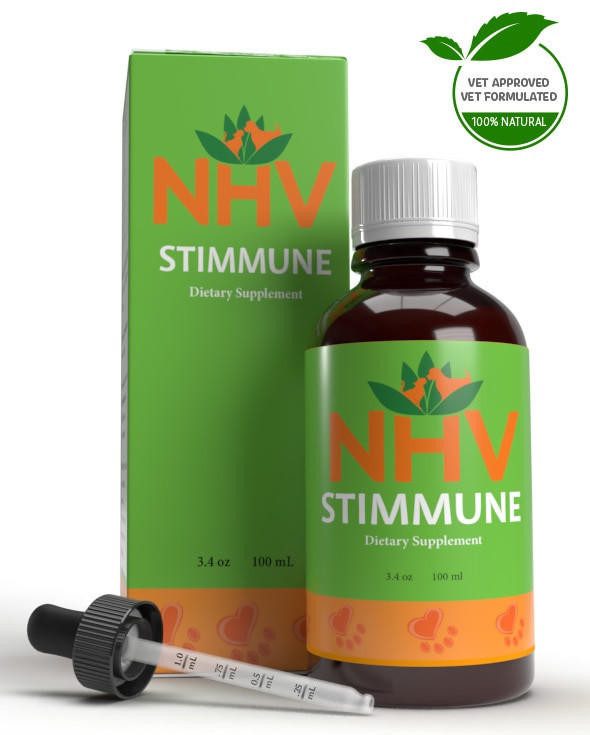
free shipping over $100 (USA & Canada)
1-877-937-4372 the pet expert hotline
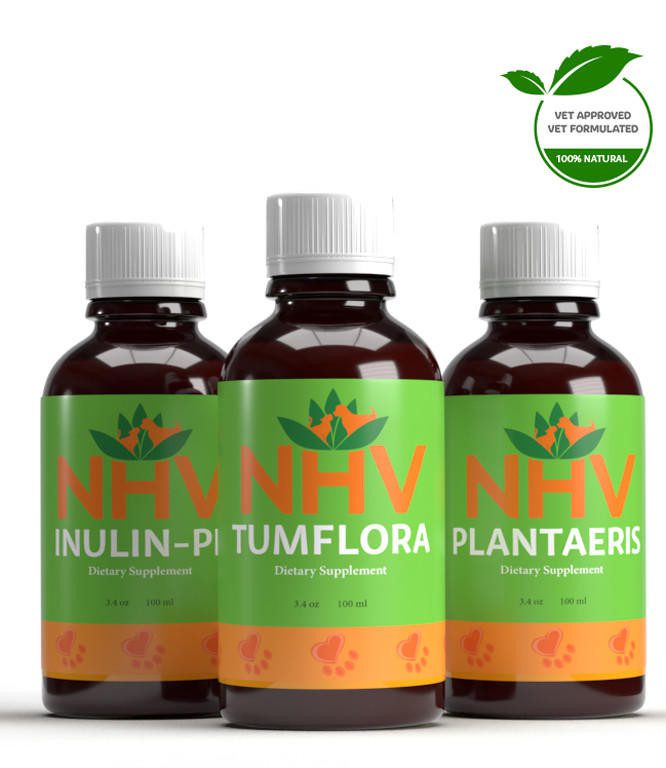
Parasite Cleanser and Diarrhea Relief

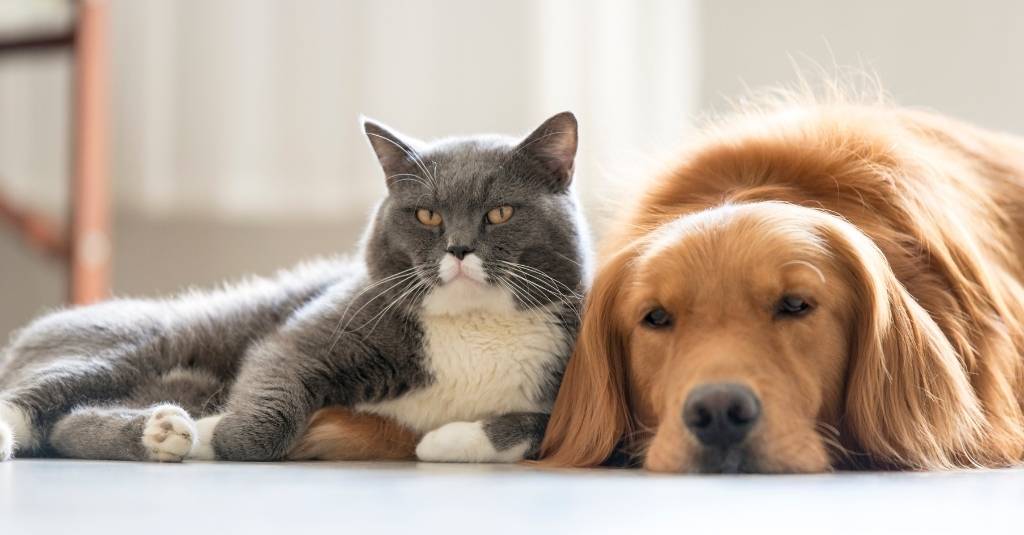
This week on NHV’s vet blog, we wanted to discuss a messy, inconvenient, but common issue for pet parents: gastrointestinal (GI) issues in dogs and cats.
First, let’s look at some common symptoms that may indicate your cat or dog is suffering from GI issues:
Causes of the above symptoms are important to diagnose due to ongoing worsening of clinical signs if not treated. Possible causes (among many!) of any GI issues in dogs and cats include parasite infections, inflammatory bowel disease, food allergies, intestinal blockage, and toxins. A trip to the vet is important when the above symptoms occur so that the appropriate diagnostics can be performed. Veterinarian diagnostics for pet GI issues could include fecal tests for parasites and bacteria, blood work to rule out metabolic, endocrine, infectious, toxic, immune-mediated issues, and imaging such as radiographs or ultrasound to rule out neoplastic or intestinal blockages causing symptoms.
Toxins are a particular cause of GI problems in pets, as they may ingest something they shouldn’t, from rummaging the garbage to eating something on a walk.
If diagnostics are done, and all major issues have been ruled out, it is possible that gastrointestinal disease in your cat or dog could have started due to a gastrointestinal irritant. Gastrointestinal irritants in pets could be pet food allergies, toxins, or even antibiotic therapy.
Toxins are a particular cause of GI problems in cats or dogs, as our pets may ingest something they shouldn’t through any number of ways, from rummaging the garbage to eating something on a walk. One of the scarier things that can cause acute vomiting and diarrhea is our human medications. Be sure to keep all medications far from reach to our pets. An emergency visit to your veterinarian is recommended if this happens!
Food allergies are a very common cause of GI problems. Unfortunately, this is a chronic disease and can be very uncomfortable. Signs of food allergies include chronic diarrhea, vomiting, belching, or frequent bowel movements (chronic itching, chronic skin disease, and ear infections may also occur!). The main gastrointestinal irritants that we see in our practice include chicken, beef, wheat, corn, and sometimes rice. A food allergy trial is the best way to determine which foods your pet is allergic to. To aid diarrhea, which often accompanies food allergies in pets, NHV offers Plantaeris, a fast-acting natural supplement to help maintain normal bowel function. NHV Stimmune has also been very useful for food allergies.
For ongoing digestive and nutritional problems, NHV offers a digestion kit that includes NHV Yucca to help with appetite and digestion, and NHV Multi Essentials for increasing nutrition. For more acute problems like constipation, NHV offers Maris, which can be particularly useful for chronic constipation; and for parasitic infection, NHV Inulin can be helpful. We use NHV often in conjunction with western medications and diet change to hasten to heal and support chronic GI issues and diseases.
If your pet is suffering from GI problems, and you would like an integrative approach to healing, please do contact us for an online consult, and we would be happy to draw up a plan for you.
immune & allergy support

Holistic Remedy for Food Allergies and Immune Support in Cats
buy 2 and save $3
3 month supply for a small to medium size
Helps your cat overcome food allergies, skin allergies, and fight infection.

Helps your cat overcome food allergies, skin allergies, and fight infection.
Cats can be allergic to the things they eat and touch, just like people can. With NHV’s Stimmune, your kitty will get potent immune supporting herbs that help support your cat with food allergy reactions, as well as reactions related to fleas, dermatitis, insect bites, diet, and exposure to chemicals and drugs. For seasonal or environmental allergies, please try Alge-Ex for a remedy specifically formulated for your cat.
At NHV, all of our pet products are formulated by a master herbalist as well as a holistic veterinarian having more than 20 years of experience. Some ingredients are even wild-crafted which means they were ethically harvested from their natural environment. Our products are also safe for long-term use and are supplements that animals like to take, including finicky kitties.
If you have questions about holistic remedies for cat allergies to food or any of our wide variety of products, you can ask an NHV expert. Our very supportive professional team of pet experts are here to help and recommend supplements because, at NHV, we want your kitty feeling pawtastic naturally!
Stimmune Is Also Helpful for:
Cats can get food allergies from their diet, and other allergies from their environment when allergens are inhaled, ingested, or absorbed by the body. Once this happens, the immune system overreacts, and this is when your kitty will need extra balance and support.
Read about a senior cat’s Helenda’s transformation using Stimmune.
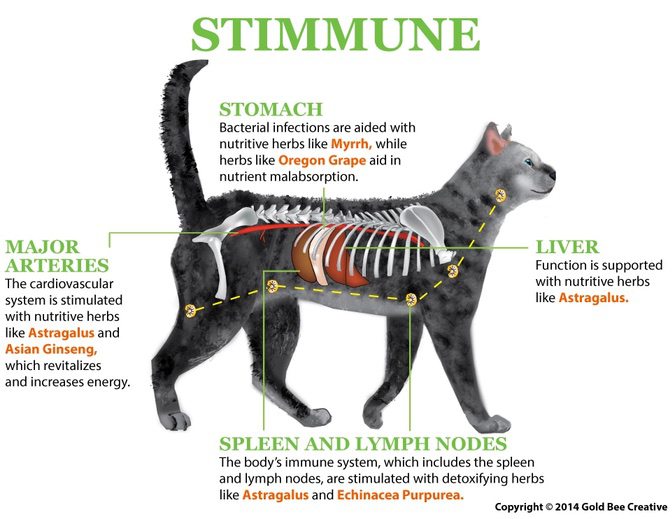
How NHV’s Stimmune Helps Allergies in Cats
Stimmune promotes healthy immune activity and histamine response with five natural herbs formulated to reduce environmental allergies in cats.
Stimmune provides support in addition to conventional treatment for all forms of allergies including pollen allergies in cats.
Select your pet's weight to determine the correct dose.
Cats can be allergic to the things they eat and touch, just like people can. With NHV’s Stimmune, your kitty will get potent immune supporting herbs that help support your cat with food allergy reactions, as well as reactions related to fleas, dermatitis, insect bites, diet, and exposure to chemicals and drugs. For seasonal or environmental allergies, please try Alge-Ex for a remedy specifically formulated for your cat.
At NHV, all of our pet products are formulated by a master herbalist as well as a holistic veterinarian having more than 20 years of experience. Some ingredients are even wild-crafted which means they were ethically harvested from their natural environment. Our products are also safe for long-term use and are supplements that animals like to take, including finicky kitties.
If you have questions about holistic remedies for cat allergies to food or any of our wide variety of products, you can ask an NHV expert. Our very supportive professional team of pet experts are here to help and recommend supplements because, at NHV, we want your kitty feeling pawtastic naturally!
Stimmune Is Also Helpful for:
Cats can get food allergies from their diet, and other allergies from their environment when allergens are inhaled, ingested, or absorbed by the body. Once this happens, the immune system overreacts, and this is when your kitty will need extra balance and support.
Read about a senior cat’s Helenda’s transformation using Stimmune.

How NHV’s Stimmune Helps Allergies in Cats
Stimmune promotes healthy immune activity and histamine response with five natural herbs formulated to reduce environmental allergies in cats.
Stimmune provides support in addition to conventional treatment for all forms of allergies including pollen allergies in cats.
Select your pet's weight to determine the correct dose.
digestive support
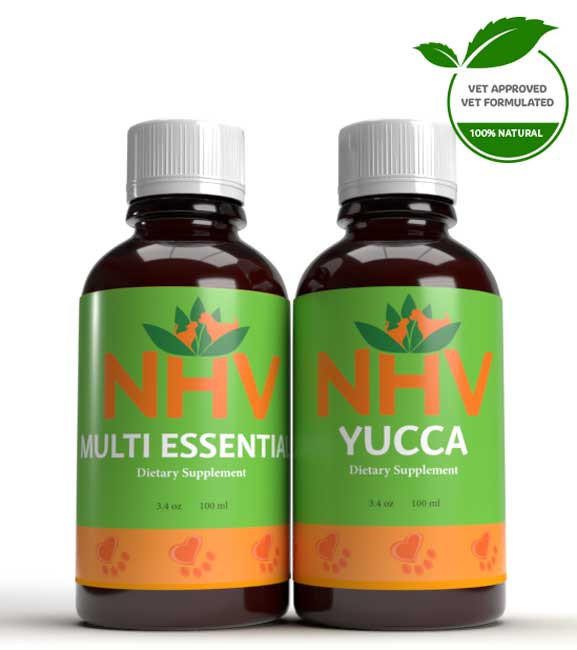
Yucca & Multi Essentials
bundle and save with pet expert kits
3 month supply for a small to medium size pet.
Digestive problems are extremely common in pets. Inadequate or inefficient digestion can lead to malnutrition, weight loss and other degenerative problems. Improve your pet's digestion with these all-natural, vet-approved supplements.

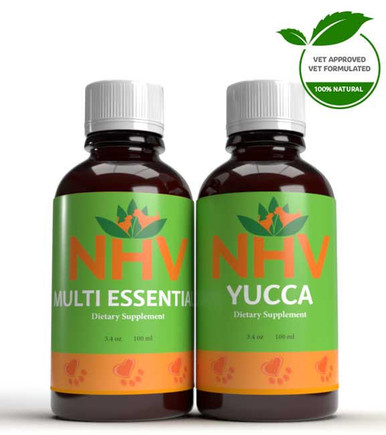
Digestive problems are extremely common in pets. Inadequate or inefficient digestion can lead to malnutrition, weight loss and other degenerative problems. Improve your pet's digestion with these all-natural, vet-approved supplements.

To be taken twice daily. Determine your pet’s weight and then use the easy chart below to determine the correct dose. This is the minimum dosage.
Pet's Weight Dosage
0 - 15 lb = 0.5 ml
16 - 30 lb = 1.0 ml
31 - 45 lb = 1.5 ml
46 - 60 lb = 2.0 ml
61 - 75 lb = 2.5 ml
Over 75 lb = 3.0 ml
How to Administer
Shake well before use. The easiest method is to use the dropper provided and place the drops into your pet’s food or favorite treat. You can also use the dropper and squirt directly into the pet’s mouth. Some pets can be finicky, if this occurs consider hiding the drops in foods most pet’s love such as fish, chicken or yogurt or a favorite treat. If your pet only eats dry food then soak a few kibbles at feeding time.
For Best Results
Herbal dietary supplements are beneficial to the health and well-being of your pet and are safe for long-term use. Every pet responds to natural herbal supplements differently, therefore it is important to be consistent and administer the product daily. Supplements generally take two to four weeks to take effect, however this will vary from one animal to the next.
Product Storage
All NHV Natural Pet Products are pure herbal extracts and contain no artificial additives, preservatives or coloring. Shelf life after opening is 6 months and must be refrigerated after opening.
All information provided by NHV Natural Pet Products is for educational purposes only.
Select your pet's weight to determine the correct dose.
Digestive issues can be caused by intestinal parasites, dietary indiscretion, food allergies and more. Consult your vet if your pet has symptoms like vomiting and diarrhea.
Digestive issues can cause malabsorption which can lead to malnutrition. IBD is also known to transition to intestinal lymphoma over time, especially in cats.
A healthy, holistic home-cooked diet can help to increase digestibility and protect a healthy digestive tract.
Digestive issues like vomiting and diarrhea can be symptoms of many, many conditions. It is always best to see your veterinarian if you notice these symptoms.
To be taken twice daily. Determine your pet’s weight and then use the easy chart below to determine the correct dose. This is the minimum dosage.
Pet's Weight Dosage
0 - 15 lb = 0.5 ml
16 - 30 lb = 1.0 ml
31 - 45 lb = 1.5 ml
46 - 60 lb = 2.0 ml
61 - 75 lb = 2.5 ml
Over 75 lb = 3.0 ml
How to Administer
Shake well before use. The easiest method is to use the dropper provided and place the drops into your pet’s food or favorite treat. You can also use the dropper and squirt directly into the pet’s mouth. Some pets can be finicky, if this occurs consider hiding the drops in foods most pet’s love such as fish, chicken or yogurt or a favorite treat. If your pet only eats dry food then soak a few kibbles at feeding time.
For Best Results
Herbal dietary supplements are beneficial to the health and well-being of your pet and are safe for long-term use. Every pet responds to natural herbal supplements differently, therefore it is important to be consistent and administer the product daily. Supplements generally take two to four weeks to take effect, however this will vary from one animal to the next.
Product Storage
All NHV Natural Pet Products are pure herbal extracts and contain no artificial additives, preservatives or coloring. Shelf life after opening is 6 months and must be refrigerated after opening.
All information provided by NHV Natural Pet Products is for educational purposes only.
Select your pet's weight to determine the correct dose.
Digestive issues can be caused by intestinal parasites, dietary indiscretion, food allergies and more. Consult your vet if your pet has symptoms like vomiting and diarrhea.
Digestive issues can cause malabsorption which can lead to malnutrition. IBD is also known to transition to intestinal lymphoma over time, especially in cats.
A healthy, holistic home-cooked diet can help to increase digestibility and protect a healthy digestive tract.
Digestive issues like vomiting and diarrhea can be symptoms of many, many conditions. It is always best to see your veterinarian if you notice these symptoms.
kidney & bladder support
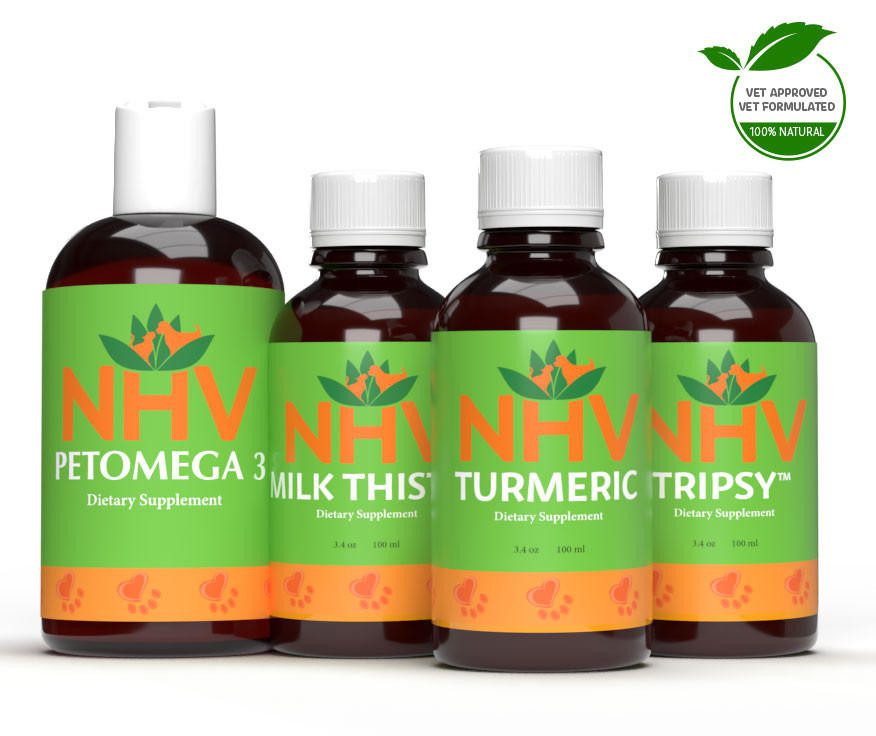
Tripsy, Milk Thistle, Turmeric & PetOmega 3
bundle and save with pet expert kits
Support your pet through kidney disease or kidney failure with all-natural supplements formulated to support organ function and help with symptoms.

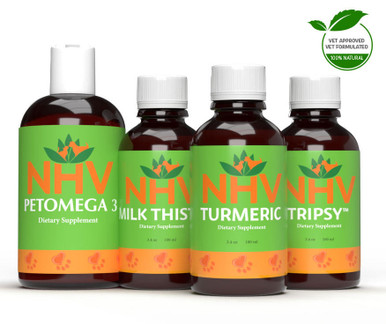
Support your pet through kidney disease or kidney failure with all-natural supplements formulated to support organ function and help with symptoms.

Powerful Support for Your Dog or Cat
Kidney issues can be really hard on pets and pet parents. The signs that your cat or dog is suffering from kidney disease or kidney failure include lethargy, weight loss, dehydration, frequent urination, and vomiting. Supporting your pet’s kidneys with gentle all-natural supplements can help them with symptoms of kidney disease and help improve their quality of life.
How NHV Remedies Provide Kidney Support for Cats and Dogs
NHV’s Kidney Support Kit for dogs and cats is used to help pets with moderate to severe chronic kidney disease and kidney failure by flushing the kidneys of impurities and improving kidney function.
The four supplements in this comprehensive kit support the kidneys in several important ways. The Omega 3 fish oils in PetOmega 3 have excellent anti-inflammatory properties, specifically for the kidneys. Omega 3 fatty acids also help reduce proteinuria (protein lost from the kidneys expelled through the urine).
Milk Thistle has strong antioxidant and detoxifying properties that may help promote cellular regeneration, repair the liver, and offer extra support to the kidneys.
Turmeric has an outstanding list of helpful benefits as an anti-inflammatory, antioxidant, antifungal, antibacterial, antiseptic, and astringent.
Tripsy™ is NHV’s main kidney support supplement. It has been studied at the University of Georgia for its potential benefits for pet health. It contains even more beneficial herbal ingredients, including Stone Root, Parsley Piert, and Gravel Root that help prevent the formation of kidney stones (kidney calculi).
Powerful Comprehensive Benefits
Order the NHV Kidney Support Kit for Dogs and Cats to provide comprehensive support in addition to their vet-recommended treatment.
PETOMEGA 3 - Omega 3 Fatty Acids are beneficial to the kidneys. This medical-grade fish oil is derived from sardine, anchovy, and North Atlantic cod liver oil. It is molecularly distilled and cold-pressed to improve the bioavailability.
MILK THISTLE - Organic Milk Thistle Seed to naturally detoxify, strengthen, and rejuvenate the liver and kidneys.
TURMERIC - An extract with natural anti-inflammatory, antioxidant, antibacterial, and antiseptic properties to support healthy kidneys.
Select your pet's weight to determine the correct dose.
PETOMEGA 3 DOSAGE : Pet’s Weight Dosage
0-15 lb = ¼ tsp
15-30 lb = ½ tsp
30-60 lb = 1 tsp
60-90 lb = 1 ½ tsp
TRIPSY, TURMERIC, MILK THISTLE DOSAGE : To be taken twice daily. Determine your pet’s weight and then use the easy chart below to determine the correct dose. This is the minimum dosage.
Pet's Weight Dosage
0 - 15 lb = 0.5 ml
16 - 30 lb = 1.0 ml
31 - 45 lb = 1.5 ml
46 - 60 lb = 2.0 ml
61 - 75 lb = 2.5 ml
Over 75 lb = 3.0 ml
For small animals (rabbits, ferrets), avians and reptiles use 1 drop for every 2 lb of body weight.
How to Administer
Shake well before use. The easiest method is to use the dropper provided and place the drops into your pet’s food or favorite treat. You can also use the dropper and squirt directly into the pet’s mouth. Some pets can be finicky, if this occurs consider hiding the drops in foods most pet’s love such as fish, chicken or yogurt or a favorite treat. If your pet only eats dry food then soak a few kibbles at feeding time.
For Best Results
Herbal dietary supplements are beneficial to the health and well-being of your pet and are safe for long-term use. Every pet responds to natural herbal supplements differently, therefore it is important to be consistent and administer the product daily. Supplements generally take two to four weeks to take effect, however this will vary from one animal to the next.
Product Storage
All NHV Natural Pet Products are pure herbal extracts and contain no artificial additives, preservatives or coloring. Shelf life after opening is 6 months and must be refrigerated after opening.
Cautions and Contraindications
Do not use in pregnant or nursing animals.
All information provided by NHV Natural Pet Products is for educational purposes only.
Powerful Support for Your Dog or Cat
Kidney issues can be really hard on pets and pet parents. The signs that your cat or dog is suffering from kidney disease or kidney failure include lethargy, weight loss, dehydration, frequent urination, and vomiting. Supporting your pet’s kidneys with gentle all-natural supplements can help them with symptoms of kidney disease and help improve their quality of life.
How NHV Remedies Provide Kidney Support for Cats and Dogs
NHV’s Kidney Support Kit for dogs and cats is used to help pets with moderate to severe chronic kidney disease and kidney failure by flushing the kidneys of impurities and improving kidney function.
The four supplements in this comprehensive kit support the kidneys in several important ways. The Omega 3 fish oils in PetOmega 3 have excellent anti-inflammatory properties, specifically for the kidneys. Omega 3 fatty acids also help reduce proteinuria (protein lost from the kidneys expelled through the urine).
Milk Thistle has strong antioxidant and detoxifying properties that may help promote cellular regeneration, repair the liver, and offer extra support to the kidneys.
Turmeric has an outstanding list of helpful benefits as an anti-inflammatory, antioxidant, antifungal, antibacterial, antiseptic, and astringent.
Tripsy™ is NHV’s main kidney support supplement. It has been studied at the University of Georgia for its potential benefits for pet health. It contains even more beneficial herbal ingredients, including Stone Root, Parsley Piert, and Gravel Root that help prevent the formation of kidney stones (kidney calculi).
Powerful Comprehensive Benefits
Order the NHV Kidney Support Kit for Dogs and Cats to provide comprehensive support in addition to their vet-recommended treatment.
PETOMEGA 3 - Omega 3 Fatty Acids are beneficial to the kidneys. This medical-grade fish oil is derived from sardine, anchovy, and North Atlantic cod liver oil. It is molecularly distilled and cold-pressed to improve the bioavailability.
MILK THISTLE - Organic Milk Thistle Seed to naturally detoxify, strengthen, and rejuvenate the liver and kidneys.
TURMERIC - An extract with natural anti-inflammatory, antioxidant, antibacterial, and antiseptic properties to support healthy kidneys.
Select your pet's weight to determine the correct dose.
PETOMEGA 3 DOSAGE : Pet’s Weight Dosage
0-15 lb = ¼ tsp
15-30 lb = ½ tsp
30-60 lb = 1 tsp
60-90 lb = 1 ½ tsp
TRIPSY, TURMERIC, MILK THISTLE DOSAGE : To be taken twice daily. Determine your pet’s weight and then use the easy chart below to determine the correct dose. This is the minimum dosage.
Pet's Weight Dosage
0 - 15 lb = 0.5 ml
16 - 30 lb = 1.0 ml
31 - 45 lb = 1.5 ml
46 - 60 lb = 2.0 ml
61 - 75 lb = 2.5 ml
Over 75 lb = 3.0 ml
For small animals (rabbits, ferrets), avians and reptiles use 1 drop for every 2 lb of body weight.
How to Administer
Shake well before use. The easiest method is to use the dropper provided and place the drops into your pet’s food or favorite treat. You can also use the dropper and squirt directly into the pet’s mouth. Some pets can be finicky, if this occurs consider hiding the drops in foods most pet’s love such as fish, chicken or yogurt or a favorite treat. If your pet only eats dry food then soak a few kibbles at feeding time.
For Best Results
Herbal dietary supplements are beneficial to the health and well-being of your pet and are safe for long-term use. Every pet responds to natural herbal supplements differently, therefore it is important to be consistent and administer the product daily. Supplements generally take two to four weeks to take effect, however this will vary from one animal to the next.
Product Storage
All NHV Natural Pet Products are pure herbal extracts and contain no artificial additives, preservatives or coloring. Shelf life after opening is 6 months and must be refrigerated after opening.
Cautions and Contraindications
Do not use in pregnant or nursing animals.
All information provided by NHV Natural Pet Products is for educational purposes only.
Published: November 6, 2015
2 replies
My cat has ckd and has issues with not eating. I saw that Yucca has phosphorus in it. Is there something else that he can take apart from Yucca.
Thanks
Jumiah
Hello Jumiah,
Thank you for your comment.
Please note that although there is some Phosphorus in the Yucca, there is not a level high enough to do any kind of significant damage to the kidneys. If you are looking for an alternative supplement that we offer to help with the appetite then we would suggest using the ES Clear as this supplement has appetite stimulating properties and would also have the effect of boosting the immune system and detoxing the vital organs. It also has the added effect of helping to boost energy levels.
Please let us know if you have any additional questions or queries and we will be happy to help.
Yours in wellness,
Robbie
NHV Natural Pet Products